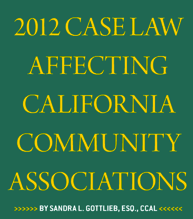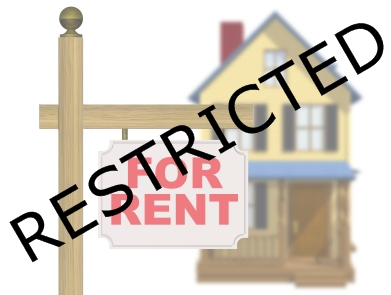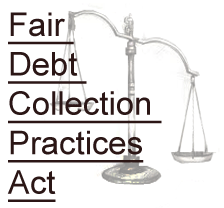By Sandra L. Gottlieb, Esq., HOA and Condo Attorneys
 Attorneys from the law firm SwedelsonGottlieb and Association Lien Services (ALS) attended Community Associations Institute Orange County Chapter’s (CAI-OC) Educational Luncheon on January 15, 2013 dealing with a California community associations’ rights and obligations following an HOA’s lien foreclosure sale. We did not like everything that we heard. This post is intended to set out our thoughts and opinions which differ from the speakers’ opinions with regard to improvements to the property during the statutory redemption period and the yet to be determined application of rent skimming to community associations and management companies.
Attorneys from the law firm SwedelsonGottlieb and Association Lien Services (ALS) attended Community Associations Institute Orange County Chapter’s (CAI-OC) Educational Luncheon on January 15, 2013 dealing with a California community associations’ rights and obligations following an HOA’s lien foreclosure sale. We did not like everything that we heard. This post is intended to set out our thoughts and opinions which differ from the speakers’ opinions with regard to improvements to the property during the statutory redemption period and the yet to be determined application of rent skimming to community associations and management companies.
The speakers at the January 15th program suggested that a California community association association that takes title to a property following foreclosure should not make improvements, including repairs necessary to rent the unit or home. We do not agree. California Code of Civil Procedure Section 729.060 contemplates that such improvements may be made to the property and that the redemption price shall include, in addition to and among other things, the “reasonable amounts for fire insurance, maintenance, upkeep, and repair of improvements on the property.” In fact, this very issue was litigated and the subject of an unpublished Court of Appeal opinion. In that case, the trial court found, and on appeal the appellate court determined, that money spent on improvements could be included in the redemption amount. In addition, the court found that there was no error in finding that the amount due in order to redeem the property previously foreclosed properly included over $17,900.00 in expenses the third party paid for maintenance and repair work on the unit after the foreclosure sale but prior to the expiration of the redemption period, an electric bill and interest on the foreclosure sale purchase price.
Continue reading





 Under California law, a condo or homeowners association has the right to foreclose on an owner’s interest in their condominium or property if they fail to pay the assessments or fees that are levied on them. It never ceases to amaze me that homeowners are surprised when their association forecloses.
Under California law, a condo or homeowners association has the right to foreclose on an owner’s interest in their condominium or property if they fail to pay the assessments or fees that are levied on them. It never ceases to amaze me that homeowners are surprised when their association forecloses. Each year, there are a number of cases, Court of Appeal or California Supreme Court decisions involving California community associations. These are cases that we lawyers rely upon. Last year (2012), there were several important cases that are important for community association managers and board members to know about. The details of the cases are discussed in an
Each year, there are a number of cases, Court of Appeal or California Supreme Court decisions involving California community associations. These are cases that we lawyers rely upon. Last year (2012), there were several important cases that are important for community association managers and board members to know about. The details of the cases are discussed in an 


 Blog article by David C. Swedelson, Esq.
Blog article by David C. Swedelson, Esq. Blog Post by David Swedelson, Founding Partner SwedelsonGottlieb
Blog Post by David Swedelson, Founding Partner SwedelsonGottlieb Blog Post By David Swedelson, SwedelsonGottlieb Community Association Attorneys
Blog Post By David Swedelson, SwedelsonGottlieb Community Association Attorneys Blog Post by David Swedelson, SwedelsonGottlieb Community Association Attorneys
Blog Post by David Swedelson, SwedelsonGottlieb Community Association Attorneys